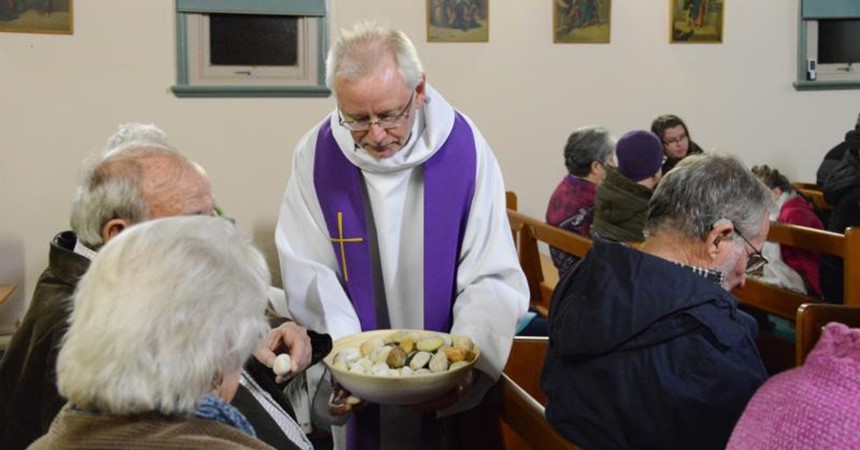Open church doors and a large banner planted in church front yards proclaim, "Missionary of Mercy here this week!" also has been the cause of much curiosity.
For the past 12 weeks, Jesuit Father Richard Shortall has been traveling in the secondhand motor home to rural parishes that have no resident priest. Each Saturday, he parks beside a church, connects to the electricity and water and makes himself at home for seven days. It's not a large motor home, but he says it has everything he needs for his travels and ministry during the Jubilee Year of Mercy.
Father Shortall is one of more than 1,000 priests -- one of two Australians -- who were accepted by Pope Francis to be a missionary of mercy during the Jubilee Year. He said he was inspired to step forward after reading the pope's words in "Misericordiae Vultus" ("The Face of Mercy") instituting the year: "I intend to send out missionaries of mercy. They will be a sign of the church's maternal solicitude for the people of God, enabling them to enter the profound richness of this mystery so fundamental to the faith."
"As soon as I read that, I felt this call. Yes, I want to be one of those missionaries of mercy," Father Shortall told Catholic News Service.
Having worked with the people of the diocese since 2013 and understanding the particular hurts felt by many of them over news about clergy sexual abuse, he felt called to offer his services.
"I had no idea how I'd do it or what was involved in being one of these missionaries of mercy, but when I shared this desire with Teresa Brierley, a vice chancellors at the diocese, her eyes lit up. She said, 'Don't worry, I know how.'"
Brierley has long wanted a priest to travel to remote communities without a resident priest. With the approval of Maitland-Newcastle Bishop William Wright and Jesuit Father Brian McCoy, provincial of the Australian Jesuits, Father Shortall is making her wish possible.
The diocese spans more than 13,000 square miles, an area larger than Maryland. Thirty priests serve in 39 parishes, which include 77 churches. An additional 17 parishes with 27 churches have no priest. It is hoped that Father Shortall will have ministered in all 27 of those communities by the time his mission of mercy on wheels ends.
"The concept of having priests moving around to rural and remote communities is not a new one," Father Shortall said. "During the early settlement times, there were priests traveling on horseback, and even in our early Jesuit tradition, we have sent out missionaries on foot or horseback for weeks at a time. So you could say we've just reverted to what we've always done. I just happen to be on wheels."
Having been accepted as a missionary of mercy, Father Shortall went to Rome in February to attend the commissioning Mass with Pope Francis. While on mission since returning, he shares his experience of Rome and unpacks the pope's message of mercy during his daily homilies.
At a recent Mass at St. Patrick and St. Brigid Church in Cooranbong he shared: "We have been discovering over the week what Francis had in mind in calling this Jubilee Year of Mercy, that when we look at the merciful face of God, it is a God of compassion, a God of kindness, a welcoming and nonjudgmental God. So as we take these qualities of God into our own hearts, when we connect with the mercy of God, we in turn become more merciful people.
"On the day of the commissioning Mass on Ash Wednesday, Francis was reminding us of ways during the Jubilee Year in which we might open our eyes. And he always kept coming back to this theme of opening the doors, not only of our churches, but also the doors of our hearts. It's all about that."
Opening doors is precisely what Father Shortall does. Each morning, he opens the doors of the church at which he is staying and they remain open throughout the day. He celebrates Mass in the morning and remains in the church, sitting quietly, reading or praying, while waiting for anyone to take up the invitation to come through the door.
Father Shortall said his biggest hope is that people accept the invitation to experience God's love and mercy by walking through the doors he has opened.
"When I first arrive, I invite people to feel free to come and talk to me about something that may be weighing them down from the past. Perhaps they've never had an opportunity to share the story with anyone else," he said.
"Now they have an opportunity to share their story to someone who is listening with compassion and who is not going to judge them. And I know from watching them and sitting with them, how important this has been for them. There is this incredible sense of relief, of being free. And for me, that's the key component of a missionary of mercy during this jubilee. The conversation may lead to the sacrament of reconciliation, but not necessarily, and that's OK.
"When someone is sitting in that chair and I might be feeling weary, I tell myself the most important person I am meeting today is that person. And the most important thing I will do today is to listen to them and give them my attention.
"I've heard many people say, 'Father I feel like a great weight has lifted from my shoulders.' It's so simple. All you need to do is love them and accept them, to be available and present to them and to listen gently, instead of shouting at them and judging them and making things difficult for them," he said.
"This is what Francis is saying, we must reach out, and make sure people still feel welcome and part of the church."
Photograph courtesy of Fiona Basile, Catholic News Service.

